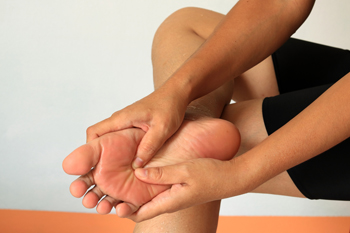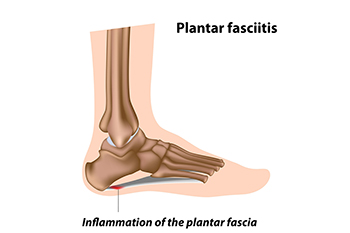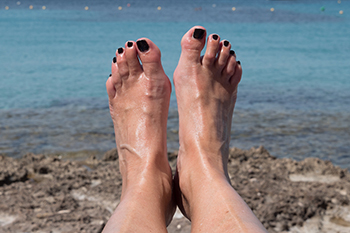Connect With Us
Blog
Items filtered by date: July 2023
Why Live with Pain and Numbness in Your Feet?
Complications of Peripheral Neuropathy

Peripheral neuropathy is a condition frequently associated with diabetes and is caused by damage to the nerves that send messages to the lower legs and feet. Symptoms include numbness, tingling, and a loss of sensation in the feet. Peripheral neuropathy can be caused by sustained high levels of sugar in the blood, from a viral infection, or by excessive smoking and drinking. In some cases, the effects of peripheral neuropathy can be reduced by treating the underlying condition. But in many cases, especially among diabetics, an unattended sore on the foot can become infected or develop into an ulcer. This complication is dangerous in that an ulcerated sore can turn into gangrene. If not treated, a foot ulcer that develops into gangrene may result in amputation. Peripheral neuropathy can also cause blood circulation problems as well as changes to heart rhythm. The main way to deal with peripheral neuropathy as it affects the feet is to inspect them carefully each day for cuts, sores, blisters, or any other abnormality that could become infected. For more information, it is suggested that you make an appointment with a podiatrist.
Neuropathy
Neuropathy can be a potentially serious condition, especially if it is left undiagnosed. If you have any concerns that you may be experiencing nerve loss in your feet, consult with James Torhorst, DPM from Torhorst Foot and Ankle. Our doctor will assess your condition and provide you with quality foot and ankle treatment for neuropathy.
What Is Neuropathy?
Neuropathy is a condition that leads to damage to the nerves in the body. Peripheral neuropathy, or neuropathy that affects your peripheral nervous system, usually occurs in the feet. Neuropathy can be triggered by a number of different causes. Such causes include diabetes, infections, cancers, disorders, and toxic substances.
Symptoms of Neuropathy Include:
- Numbness
- Sensation loss
- Prickling and tingling sensations
- Throbbing, freezing, burning pains
- Muscle weakness
Those with diabetes are at serious risk due to being unable to feel an ulcer on their feet. Diabetics usually also suffer from poor blood circulation. This can lead to the wound not healing, infections occurring, and the limb may have to be amputated.
Treatment
To treat neuropathy in the foot, podiatrists will first diagnose the cause of the neuropathy. Figuring out the underlying cause of the neuropathy will allow the podiatrist to prescribe the best treatment, whether it be caused by diabetes, toxic substance exposure, infection, etc. If the nerve has not died, then it’s possible that sensation may be able to return to the foot.
Pain medication may be issued for pain. Electrical nerve stimulation can be used to stimulate nerves. If the neuropathy is caused from pressure on the nerves, then surgery may be necessary.
If you have any questions, please feel free to contact our offices located in Waupaca and Stevens Point, WI . We offer the newest diagnostic and treatment technologies for all your foot care needs.
The Dangers of Hiking With Wet Feet

Hikers can easily get wet feet, simply by having to cross a stream, or from a sudden downpour. Hiking experts recommend not hiking in conditions that may cause your feet to get wet. Potential problems from continuing to hike after your feet are wet include developing fungal infections and blisters. Possible infections include athlete’s foot, which can cause cracked, itchy, and inflamed skin between the toes, and toenail fungus, which can cause the nails to crumble and flake. This also can endanger the nail bed itself. Blisters are caused by friction as the side of the toe or heel rubs against the inside of a shoe. If the activity continues when a blister forms, it not only can be painful, but it can become infected. Prevention measures include wearing waterproof boots, carrying an extra pair of moisture-wicking socks, and investing in a pair of gaiters that help to keep your feet dry. For more information on how to keep your feet safe while hiking, it is suggested that you consult a podiatrist.
Sports related foot and ankle injuries require proper treatment before players can go back to their regular routines. For more information, contact James Torhorst, DPM of Torhorst Foot and Ankle. Our doctor can provide the care you need to keep you pain-free and on your feet.
Sports Related Foot and Ankle Injuries
Foot and ankle injuries are a common occurrence when it comes to athletes of any sport. While many athletes dismiss the initial aches and pains, the truth is that ignoring potential foot and ankle injuries can lead to serious problems. As athletes continue to place pressure and strain the area further, a mild injury can turn into something as serious as a rupture and may lead to a permanent disability. There are many factors that contribute to sports related foot and ankle injuries, which include failure to warm up properly, not providing support or wearing bad footwear. Common injuries and conditions athletes face, including:
- Plantar Fasciitis
- Plantar Fasciosis
- Achilles Tendinitis
- Achilles Tendon Rupture
- Ankle Sprains
Sports related injuries are commonly treated using the RICE method. This includes rest, applying ice to the injured area, compression and elevating the ankle. More serious sprains and injuries may require surgery, which could include arthroscopic and reconstructive surgery. Rehabilitation and therapy may also be required in order to get any recovering athlete to become fully functional again. Any unusual aches and pains an athlete sustains must be evaluated by a licensed, reputable medical professional.
If you have any questions please feel free to contact our offices located in Waupaca and Stevens Point, WI . We offer the newest diagnostic and treatment technologies for all your foot and ankle needs.
Incorrect Shoes and Walking Barefoot May Cause Plantar Fasciitis

The foot condition that is known as plantar fasciitis affects many people across the globe. It happens when the plantar fascia becomes irritated or torn from gradual overuse, or possibly from an injury. The plantar fascia is found on the sole of the foot, and connects the heel to the toes. It is responsible for walking and running, and completing daily activities can be difficult if it becomes damaged. A common cause of this foot condition is wearing shoes that do not fit correctly, which may cause heel support to be lost and uneven steps to be taken. People who walk barefoot may find the ligaments in their feet become damaged, and these are crucial in providing adequate support for the feet. If this pertains to you, it is beneficial to limit the time walking barefoot, and it can help to wear shoes with adequate cushioning in the heel area. If you have developed plantar fasciitis, it is strongly suggested that you are under the care of a podiatrist who can properly diagnose and offer correct treatment options for plantar fasciitis.
Plantar fasciitis is a common foot condition that is often caused by a strain injury. If you are experiencing heel pain or symptoms of plantar fasciitis, contact James Torhorst, DPM from Torhorst Foot and Ankle. Our doctor can provide the care you need to keep you pain-free and on your feet.
What Is Plantar Fasciitis?
Plantar fasciitis is one of the most common causes of heel pain. The plantar fascia is a ligament that connects your heel to the front of your foot. When this ligament becomes inflamed, plantar fasciitis is the result. If you have plantar fasciitis you will have a stabbing pain that usually occurs with your first steps in the morning. As the day progresses and you walk around more, this pain will start to disappear, but it will return after long periods of standing or sitting.
What Causes Plantar Fasciitis?
- Excessive running
- Having high arches in your feet
- Other foot issues such as flat feet
- Pregnancy (due to the sudden weight gain)
- Being on your feet very often
There are some risk factors that may make you more likely to develop plantar fasciitis compared to others. The condition most commonly affects adults between the ages of 40 and 60. It also tends to affect people who are obese because the extra pounds result in extra stress being placed on the plantar fascia.
Prevention
- Take good care of your feet – Wear shoes that have good arch support and heel cushioning.
- Maintain a healthy weight
- If you are a runner, alternate running with other sports that won’t cause heel pain
There are a variety of treatment options available for plantar fasciitis along with the pain that accompanies it. Additionally, physical therapy is a very important component in the treatment process. It is important that you meet with your podiatrist to determine which treatment option is best for you.
If you have any questions, please feel free to contact our offices located in Waupaca and Stevens Point, WI . We offer the newest diagnostic and treatment technologies for all your foot care needs.
All About Erythromelalgia

Different kinds of relatively rare conditions of the feet affect a small number of people. A condition known as erythromelalgia is one such type of foot affliction. Erythromelalgia is essentially defined by a burning and redness that can develop in the feet. However, the symptoms of erythromelalgia are not confined to the feet. Namely, the symptoms of this condition can also be felt in the hands, arms, legs, and even the face area. Another important symptom that is associated with erythromelalgia is warmness in the skin. Certain activities can trigger one’s erythromelalgia, including feeling stressed and wearing tight shoes. If you are someone that wants to learn more about erythromelalgia and other rare foot conditions, it is suggested that you contact a podiatrist today for more information.
Some foot conditions may require additional professional care. If you have any concerns, contact James Torhorst, DPM of Torhorst Foot and Ankle. Our doctor can provide the care you need to keep you pain-free and on your feet.
Rare Foot Conditions
The majority of foot conditions are common and can be treated by a podiatrist. Standard diagnostic procedures are generally used to identify specific conditions and treatment can be rendered. A podiatrist also treats rare foot conditions which can be difficult to diagnose and may need extra attention and care.
There are many rare foot conditions that can affect children. Some of these can include:
- Freiberg’s disease
- Kohler’s disease
- Maffucci syndrome
Freiberg’s disease - This can be seen as a deterioration and flattening of a metatarsal bone that exists in the ball of the foot. It typically affects pre-teen and teenage girls, but can affect anyone at any age. Symptoms that can accompany this can be swelling, stiffness, and the patient may limp.
Kohler’s disease - This often targets the bone in the arch of the foot and affects younger boys. It can lead to an interruption of the blood supply which ultimately can lead to bone deterioration. The patient may limp or experience tenderness, swelling, and redness.
Maffucci syndrome - This affects the long bones in a child’s foot leading to the development of abnormal bone lesions. They are benign growths and typically develop in early childhood and the bones may be susceptible to breaking.
A podiatrist can properly diagnose and treat all types of rare foot conditions. If your child is affected by any of these symptoms or conditions, please don’t hesitate to call our office so the correct treatment method can begin.
If you have any questions please feel free to contact our offices located in Waupaca and Stevens Point, WI . We offer the newest diagnostic tools and technology to treat your foot and ankle needs.

